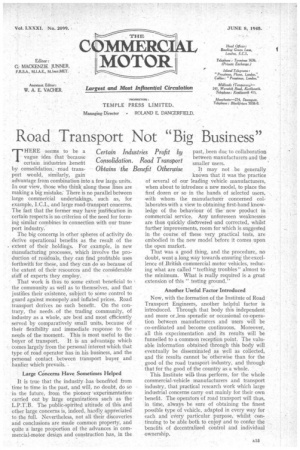Road Transport Not "Big Business"
Page 17

If you've noticed an error in this article please click here to report it so we can fix it.
THERE seems to be a vague idea that 'because certain industries benefit by consolidation, road -transport would, similarly, gain advantage from combination into a few large units. In our view, those who think along these lines are making a big mistake. There is no parallel between large commercial undertakings, such as, for example, I.C.I., and large road-transport concerns. The fact that the former may have justification in certain respects is no criterion of the need for forming similar combines in connection with our transport industry.
The big concerns in other spheres of activity do derive operational benefits as the result of the extent of their holding's. For example, in new manufaCturing processes, which involve the production of residuals, they can find profitable uses forthwith for these, and they can do so because of the extent of their resources and the considerable staff of experts they employ.
That work is thus to some extent beneficial to the community as well as to themselves, and that justifies their existence, subject to some control to guard against monopoly and inflated prices. Road transport derives no such benefit. On the contrary, the needs of the trading community, of industry as a whole, are best and most efficiently served by comparatively small units, because of their flexibility and immediate response to the needs of the moment. This is most useful to the buyer of transport. It is an advantage which comes largely from the personal interest which that type of road operator has in his business, and the personal contact 'between transport buyer_ and haulier which prevails. .
Large Concerns Have Sometimes Helped It is true that the industry-has 'benefited from time to time in the past, and Will, no doubt, do so • in the future, from the pioneer experimentation carried out by large organizations such as the L.P.T.B. The public-spirited attitude of this and other large concerns is, indeed, hardly appreciated to the full. Nevertheless, not all their discoveries and conclusions are made common property, and quite a large proportion of the advances in commercial-motor design and construction has, in the past, been due to collaboration between manufacturers and the smaller users.
It may not be generally known that it was the practice of several of our leading vehicle manufacturers, when about to introduce a new model, to place the first dozen or so in the hands of selected users, -with whom the manufacturer concerned collaborates with a view, to obtaining first-hand knowledge of the behaviour of the' new product in commercial service_ Any unforeseen weaknesses are thus quickly disclovered and corrected, whilst further improvements, room for which is suggested in the course of these very _practical tests, are embodied in the new model before it comes upon the open market.
That Was a good thing, and the procedure, no doubt, went a long way towards ensuring the excellence of British commercial motor vehicles, reducing what are called "teething troubles" almost to the minimum. What is really required is a great • extension of this ".testing ground."
Another Useful Factor Introduced Now, with the Sormation of the Institute of Road Transport Engineers, another helpful factor is introduced. Through that body this independent and more or,less sporadic or occasional co-operation between manufacturers and users will be co-ordinated and become continuous. Moreover, all this experimentation, and its results will be funnelled to a common reception point. The valuable information obtained through this body will eventually be disseminated as well as collected, and the results cannot be otherwise than for the good of the road transport industry, and through that for the good of the country as a whole.
This Institute willthus perform, for the whole commercial-vehicle manufacturers and transport industry, that practical research work which large industrial concerns carry out mainly for their own benefit. The operators of road transport will thus, in time, always be sure of obtaining the finest possible type of vehicle, adapted in every way for each and eVery particular purpose, whilst continuing to be able both to enjoy and to confer the benefits of decentralized control and individual ownership.




















































